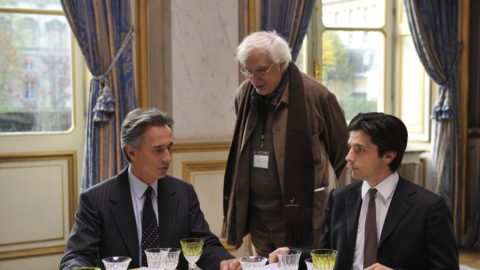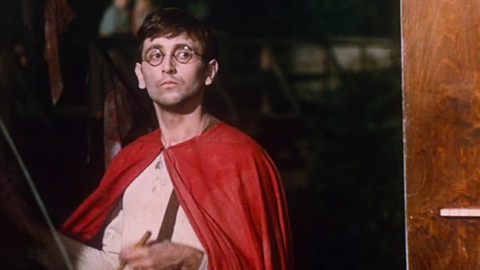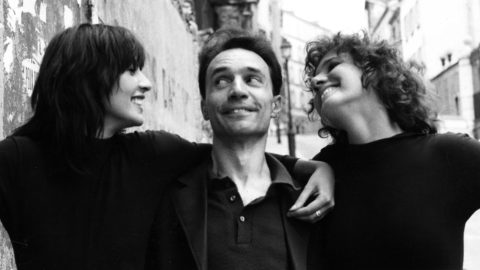NYFF: Jacques Becker
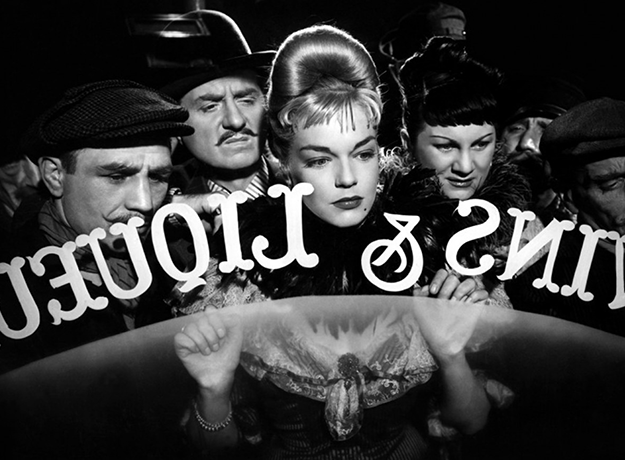
Casque d’Or
The films Jacques Becker made in a remarkable run between the mid-Forties and the mid-Fifties—including two melancholic crime dramas (Casque d’Or and Touchez pas au grisbi) and three under-seen, tonally unpredictable comedies (Antoine and Antoinette; Rendez-vous in July; Édouard et Caroline)—tend to ripen in an atmosphere of patient observation, letting their characters make an impression slowly and accumulating local and period detail as they move. In the climate they maintain, loud declamatory speeches and grandstanding gestures don’t grow easily. But sometimes, nonetheless, they erupt. Late in Rendez-vous in July (49), the film’s central character, a hotheaded, unlikable aspiring anthropologist named Julien (Daniel Gélin), gives a speech shaming three of his friends for backing out of the ethnographic film for which he’s just secured travel and funding. He’s made the announcement at a party in front of their extended social circle, and there is an element of public embarrassment in his reaction when, one-by-one, his collaborators tell him they can’t make the trip. (One just got a new job; a second now has to support his widowed mother; a third awaits a visit from his American in-laws.) He chastises them for their lack of ambition, for giving up on their artistic dreams, and for their “pathetic” willingness to settle like their parents did for a less adventuresome sort of life. “Your folks are half-dead and don’t know it,” he says. “They found their place and stayed put.”
By the end of the scene, Julien has won. Convinced, or bullied, his friends agree to the trip. In Becker’s universe, this is not necessarily a happy outcome. His films are filled with both loners and couples who want nothing more than to “find their place and stay put,” and yet for whom settling down—making a home—is a fraught and insecure operation. One of the only vocal outbursts we hear from Max (Jean Gabin), the aging, habitually subdued gangster in Touchez pas au grisbi (54), comes when he’s berating his clumsy sideman Riton (René Dary) for making a slip that could cost him the stolen small fortune on which he’s staked his retirement. He craves the kind of easy, unhurried life he’s been acting out with Riton throughout the hushed scene during which that outburst comes—inviting him up to his pristine apartment; boasting about the place’s quietness; laying out toast for the two of them with butter and pâté.
The couple at the center of Casque d’Or (52)—a Belle Époque courtesan (Simone Signoret) and the blacksmith who’s killed her gangster lover in a knife fight—attend just as solicitously to making coffee and reading the paper during the brief domestic idyll they enjoy midway through that film. (They’ve gone into hiding at a farmhouse outside Paris.) In comparison, the financially pressed and emotionally turbulent Parisian couples at the center of Antoine and Antoinette (47) and Eduard and Caroline (51) lead enviably settled lives. But they still crave more domestic security than they have, and the movies they inhabit scrutinize the moods and rhythms of their time at home together: their meals; their arguments; their handling and mending of clothes; their interventions with the radio; the ebbing and flowing of their attraction to one another. (At the end of both those movies, these lifestyles are given an expiration date when the couple in question is promised a windfall of cash.) To watch these movies in succession is to be immersed in a world where small pleasures are counted dearly and petty slights sting hard—where the habits, routines, and daily indignities and frustrations that shape a life are emphasized rather than downplayed or ignored.
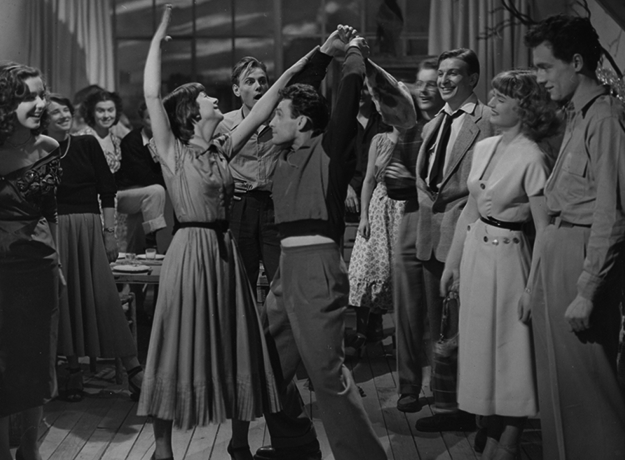
Rendez-vous in July
For decades, Becker himself was a relatively ignored figure. This year, he’s been getting a welcome upsurge of attention. Gaumont’s restoration of Rendez-vous in July premiered in the Classics section of May’s edition of Cannes, and Antoine and Antoinette is one of a handful of classic French studio productions screening at this month’s New York Film Festival. This summer, eight of Becker’s thirteen features, including early rarities like Falbalas (45) and Groupi mains rouge (43), played at the festival Il Cinema Ritrovato in a retrospective named after the quality Serge Daney saw represented in Becker’s great, late prison escape film Le Trou (60)—“the very idea of freedom.”
The director and scholar Bertrand Tavernier’s documentary My Journey Through French Cinema, which occasioned this series at the NYFF and opens theatrically next spring, begins with a 20-minute-long tribute to Becker, whose early feature Dernier atout Tavernier considers one of his first memorable encounters with the movies. Tavernier’s description of Becker has a deeply familiar tone that suggests lifelong admiration, and he can be forgiven some sentimentality: “To me,” he muses at one point over footage from Antoine and Antoinette, Becker “had a sense of common decency… which implies ordinary acts of mutual aid and trust, minimal but basic social ties. Not an ethic, but a spontaneous sense of what should and shouldn’t be done.”
Some of the confidence Tavernier sees in Becker’s movies—the sense they give of a filmmaker utterly, almost casually sure of his instincts—might be attributed to his having come to directing only after a long apprenticeship. He was born in 1906 to well-off parents; his father was a prominent manufacturer, and his Irish mother owned the kind of fashionable Parisian boutique he’d later depict in Falbalas (“Paris Frills”). On the first page of her book Jacques Becker, ou L’Exercise de la liberté, the scholar Valérie Vignaux hints that Julien’s stifling upper-class household in Rendez-vous in July, dominated by a shrill, venomous father who treats his son’s creative ambitious with disdain, owed something—in its exaggerated way—to the atmosphere of Becker’s own upbringing. Possibly in reaction to that atmosphere, Becker developed an intense and sometimes over-romantic attachment to the textures of working-class French life. When he filmed couples like Antoine and Antoinette, who live in a cluttered apartment, make simple meals and work tiring nine-to-five jobs—he works at an industrial bookbindery, she at a department store—it was often with a kind of envy and awe.
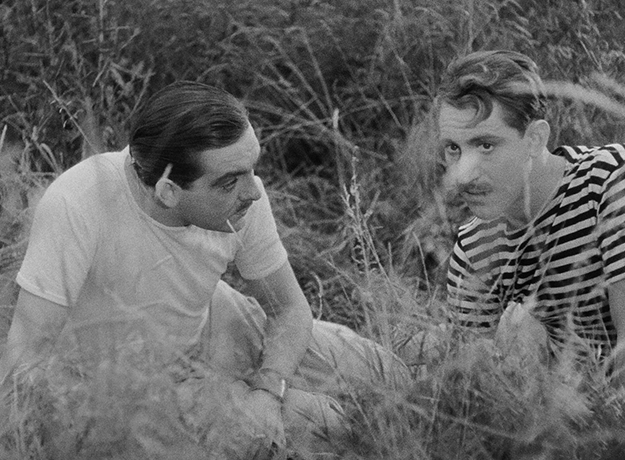
A Day in the Country
Becker’s family lived near the home of Paul Cézanne, who died the year Jacques was born. In 1921 the painter’s son, also named Paul, introduced Becker to Jean Renoir, who was just about to embark on a career in the movies. “He was the perfect representation of everything I hated,” Renoir would later write in a passage Vignaux quotes: “the great French bourgeoisie, familiarity with bars; practice at onerous sports.” Before long, however, Becker had won Renoir over. The older man decided he had met someone who “loved humanity not only with a general, theoretical love but directly, individually,” and the two became intimate friends. By the mid-Thirties, Becker was serving as Assistant Director—and more generally as a kind of artistic collaborator—for many of Renoir’s finest movies, including The Lower Depths, Grand Illusion, A Day in the Country and La Nuit du Carrefour, a fog-covered Simenon adaptation that lent some of its world-weary, bleary-eyed tone to Touchez pas au grisbi. He didn’t make a feature himself until 1942, midway through the Occupation, when he was thirty-six.
That Becker worked for so long under Renoir has led to a somewhat irritating tendency on the part of critics to compare the two directors’ visual sensibilities, with Renoir cast as the playful, unpredictable genius and Becker as the capable but somewhat stolid straight man. Certainly Becker tended not to shoot scenes like the vertiginous passage in A Day in the Country that shows an older man watching a young woman teeter back and forth on a swingset while the camera swoops up and down with her; but did he need to? Compare that famous seduction scene with one of Becker’s own—Signoret’s character in Casque d’Or dancing with her callous boyfriend but managing, with constant smooth pivots of the head, never to break eye contact with the handsome man watching her—and Becker seems, if anything, worldlier, subtler, and more confident in the means at his disposal.
The camera set-ups in that scene are simple and unassuming: close-ups on the face of Signoret’s admirer alternating with shots that follow the dancing couple as they twirl across the dance floor and back again. But the rhythm is meticulous, perfectly suited to the way these people carry themselves through space. Early in My Journey Through French Cinema, Tavernier studies a similarly exact cluster of shots from Casque d’Or that show three characters entering the same dive bar: a society lady worried she’s slumming too riskily; Signoret’s Marie, all assurance and bold humor; and her new paramour, humorless but undaunted by what he clearly considers a familiar hangout. We’re encouraged to see how carefully Becker adjusts the energy levels and internal rhythms of each shot to suggest how, in each case, the character in question reacts to the atmosphere of the place they’ve wandered into. On close inspection, here and elsewhere, Becker’s reluctance to call attention to the movements of the camera itself—which might have initially come off as stolidity or dull competence—becomes a sign of his total dedication to catching the movements of specific people in time.
Nowhere is this tendency indulged more lavishly than in the first twenty minutes of Antoine and Antoinette, which show that film’s central couple getting off work, traveling home by metro and bike and cycling through their evening errands. She runs into a friend who works in the metro, goes to the corner store to buy leeks, and repulses the familiar advances of a lecherous grocer (and yet accepts the tin of expensive sardines he slips her). Once he’s home, Antoine tinkers with their radio, which a string of improvised-looking cables connects to a rooftop antenna; together, the two of them putter over dinner and chat about their days. Underpinning the entire passage is a kind of casual eroticism that works on the scene like a faint piece of background music, quietly energizing it without overpowering the rest of the action. Becker populated his movies with almost implausibly attractive people, some of whom—Roger Pigaut; Claire Mafféi; Anne Vernon—have since been largely forgotten. He knew that their faces were strong and potent things, and he saved his close-ups for moments when the lovers in question were locked in a particularly intense kind of communion; watching them, it’s as if you’re being dared to fall in love with both of them, too.
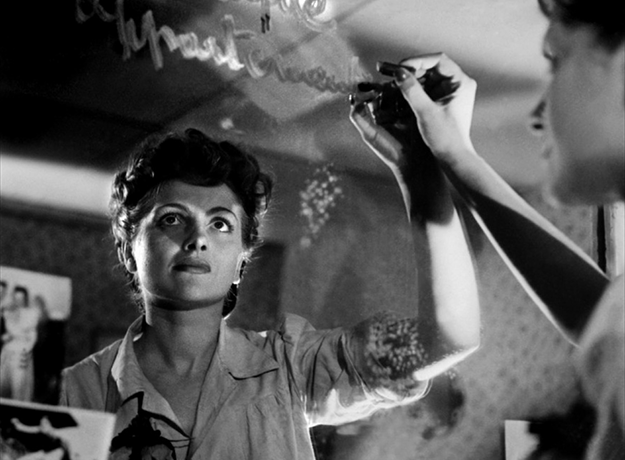
Antoine and Antoinette
Becker was keenly interested in the varieties of coupledom. The marriages and romances he filmed were complicated arrangements, but in the films from this period they tended to conform to a certain formula. At their center, there was usually an intelligent, beautiful, strong-willed and personable woman: Antoinette; Caroline; Marie. (Christine, the young stage actress Julien unjustly rejects in Rendez-vous in July, is a poignant figure but gets less time and space to impress herself on that movie, where the most prominent female character, Christine’s friend Brigitte, is romantically linked to Julien’s right-hand-man.) These women live in threatening worlds, full of repellant or snakelike men—the grocer in Antoine and Antoinette; the mob boss in Casque d’Or who bullies and blackmails Marie into sharing his bed; Caroline’s noxiously entitled cousin; Christine’s predatory theater director—conspiring to seduce or entrap them.
The men Becker’s women love are often more ambiguous types, although the two most prominent male characters in Rendez-vous in July are easy enough to judge. Julien, who abandons Christine after catching her and Brigette with the director who practically strong-armed them into coming up for a drink, is a vainly handsome cad whose artistic career and bohemian life haven’t dampened his aristocratic hauteur. His friend Roger (Maurice Ronet), who reunites with Brigette in the movie’s last scene, embodies the kind of decency to which Julien won’t stoop. Perhaps because the movie’s central characters were relatively simple and fixed, Becker crowded Rendez-vous in July with packs of partygoers and hangers-on; in contrast to his other comedies, it’s less of a domestic movie than a raucous jazz musical. (When their plane has to leave early, Julien pulls his friend—unforgivably, one mutters—offstage from the latter’s gig as a sideman at a Rex Stewart set.) In Antoine and Antoinette and Eduard and Caroline, in contrast, Becker made it harder to say where his male heroes fall on the spectrum between caddishness and decency.
What should we make, for instance, of Antoine’s jealousy over Antoinette when he comes home and finds the bouquet of flowers that their grocer forced on her? Is he forgivably protective or unduly possessive? And what should be made of the fact that she seems attracted to him partly for his bullishness—not only for his physical bulk but also for the power and authority he chauvinistically tries to exert over her? That they end up winning the lottery (much of the movie’s plot turns on their attempts to recover their misplaced winning ticket) hardly matters; by the end of the film, what counts is whether the odd mixture of tenderness and combativeness in their marriage can be kept up.
Eduard and Caroline are a direr case. A brilliant pianist, he’s been kept in obscurity largely, it’s suggested, by his nasty, combative temperament. (He is played again by Daniel Gélin, whose features seem to have given Becker the impression of something unsympathetic or cruel.) On the evening during which the entire film takes place, he’s been hired to give a recital at the home of his wife’s snobbish, wealthy uncle. This setup gives Becker limitless opportunities to contrast Eduard and Caroline’s charmingly bohemian lifestyle with the atmosphere of airless luxury her family inhabit; the uncle, with his affected English, is one of Becker’s broadest caricatures. (“They understood me perfectly well at Oxford, I can assure you.”) But the film is really an extended quarrel—a skirmish between Caroline’s sensibility and Eduard’s bitterer, pettier, controlling one.
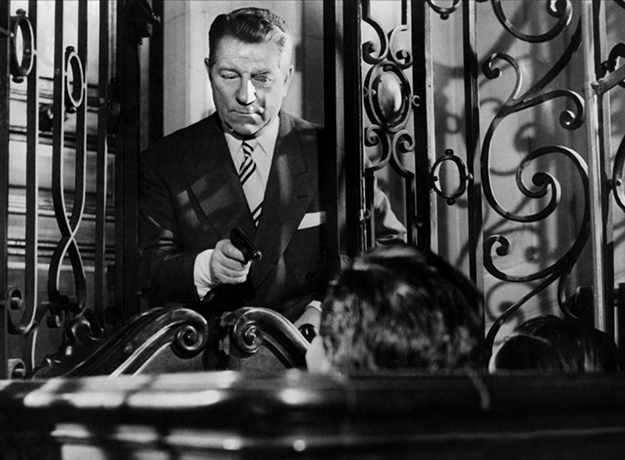
Touchez pas au grisbi
On the evening of the recital, he chastises her for having thrown out his old waistcoat. While he’s out borrowing a new one, she takes a scissors to the hem of her dress to make it correspond to the gowns in the fashion magazines she reads; when he sees how the altered dress exposes her calves, he flies into a rage and slaps her. She tells him she wants a divorce. (As the critic Dan Sallitt has pointed out, many of Becker’s films turn on scenes of men slapping women, which suggests both Becker’s frank attitude towards domestic violence and his willingness to introduce jarring or atonal elements into the humming melodies his movies usually carry on.) By the movie’s last three minutes, in which we see him chase her around their apartment and pin her to the bed against her protests, he’s become a palpable physical threat to her. Presumably referring to this climax, Tavernier told me in a 2014 interview that “just at the end” of Eduard and Caroline, “there’s a moment when it could become a drama.” This scene of domestic aggression, explicitly overlaid with the threat of rape, strikes me as the point when the movie does become a drama—the moment when its comic energy seeps out.
Then the phone rings. On the line is the rich American tycoon Eduard met at his thwarted recital, offering him a concert booking that’s all but guaranteed to set him on a lucrative career. When Eduard puts down the phone and mutters the news, the scene’s atmosphere of violence and threat dissolves, and the spouses take each other up in a happy embrace. It’s a puzzling and disquieting ending, and one that exemplifies Becker’s sometimes unpalatable vision of what it means to be a couple—his view that romantic alliances between men and women are fluid and volatile, contingent on mood and circumstance, always threatening to devolve into violence or resolve themselves into mutual accord depending on what forces intrude on them or what objects and settings they take in.
This is not a comforting picture, and that Becker committed to it so intensely helps explain why he’s been slow to receive his due. It is not surprising that his best-known films (Casque d’Or; Touchez pas au grisbi; Le Trou) end in resonantly tragic climaxes. In those cases, we at least have the satisfaction of knowing how to respond, a sense of closure in death or defeat. The comedies—if they can be called that—are almost more disquieting for the mixed signals they send and the shifting territory on which they seem to have been set up. They show couples collecting home goods, groceries, radios and well-kept clothes as ballast for an essentially unstable arrangement, while threats of abandonment and abuse linger overhead.
Max Nelson is an editorial assistant at The New York Review of Books and writes the Restoration Row column for Film Comment.



